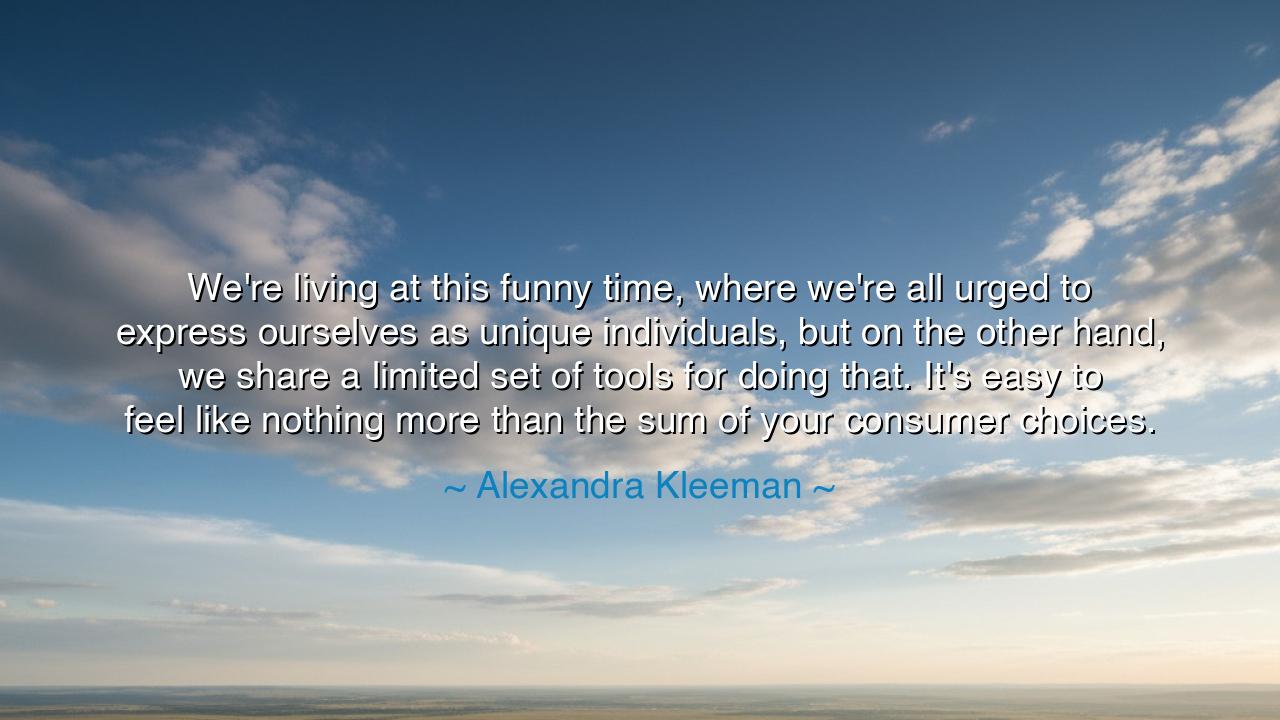
We're living at this funny time, where we're all urged to express
We're living at this funny time, where we're all urged to express ourselves as unique individuals, but on the other hand, we share a limited set of tools for doing that. It's easy to feel like nothing more than the sum of your consumer choices.






The writer Alexandra Kleeman, a keen observer of the modern spirit, once said: “We’re living at this funny time, where we’re all urged to express ourselves as unique individuals, but on the other hand, we share a limited set of tools for doing that. It’s easy to feel like nothing more than the sum of your consumer choices.” Her words, though spoken in the language of our age, carry the weight of an ancient lament — the cry of the soul lost amid the glittering market of appearances. She speaks to a paradox: that we are taught to celebrate individuality, yet bound by the invisible chains of consumption, mistaking what we buy for who we are.
In this “funny time,” as she calls it, we live surrounded by the illusion of endless choice. We clothe ourselves in brands, decorate our homes with objects, and declare our identities through devices and symbols designed by others. Yet these are not expressions of the self — they are echoes of an economy that has learned to package desire. What we mistake for self-expression is often imitation, dressed in the costume of originality. We believe we are shaping our image, but it is the world of commerce that molds us, gently and invisibly, like a sculptor working in shadows. Thus, Kleeman’s words awaken us to the silent tragedy of modern freedom: that in our quest to be unique, we have become uniform.
The ancients knew this danger by another name: vanity — the pursuit of image over essence. In the Roman age, the philosopher Seneca warned against those who lived not as themselves but as reflections of others. “They borrow their joys,” he wrote, “and measure their worth by what can be seen, not by what can be felt.” So too in our time, many measure their value not by their thoughts, but by their possessions. The marketplace has become our temple; its brands, our gods. And yet, as Kleeman reminds us, these tools of expression — the clothes, the gadgets, the curated lives — are shared by all, leaving little room for true individuality to breathe.
Think of Socrates, who owned almost nothing but his wisdom. When others flaunted wealth, he would walk barefoot through the markets of Athens, laughing softly and saying, “How many things there are that I do not need.” His joy was not in rejecting the world, but in knowing that his worth could not be purchased. In this way, he embodied the truth that Kleeman hints toward: that authenticity cannot be sold. It must be discovered, crafted not from the tools of consumption, but from the depths of reflection and self-awareness. To know oneself is to step beyond the mirage of material choice.
The origin of Kleeman’s words lies in the age of the screen — an era when identity is both visible and fragile. Social media, fashion, technology — all urge us to proclaim, “I am different!” But the platforms that host our difference are the same for all. The filters, the trends, the viral tones of speech — they homogenize us even as we strive to stand apart. This is the great irony of our time: the louder we shout for individuality, the more our voices blend into a chorus of sameness. And so, the self that once sought meaning now risks dissolving into a sum of consumer choices, defined by what it owns, not what it feels.
There is a deep sadness in this — but also a call to awakening. For Kleeman does not speak in despair, but in invitation. She asks us to look beyond the tools given to us — to create new forms of expression that spring not from the market but from the spirit. To read deeply, to write one’s own words, to build, to love, to wander without posting, to live moments that no algorithm can record. These are the true acts of rebellion in an age that sells rebellion as a brand. The self, once rediscovered, becomes untouchable by trend.
So let the lesson be this: seek not to prove your uniqueness through the objects you possess, but through the depth of your thought, the courage of your silence, and the sincerity of your action. The world will tempt you to define yourself by what you consume — resist. Do not let your spirit be cataloged by corporations or reduced to patterns of preference. Instead, shape your life as the ancients shaped their philosophies: with patience, integrity, and love for truth. For only when the self ceases to be a product can it begin to be a presence.
Therefore, my child, when you feel the pull of this “funny time,” step back. Ask not, “What should I buy to be seen?” but “What should I create to be known?” Read what stirs your heart, speak what feels real, love what cannot be priced. Remember that the soul’s light cannot be sold in stores — it is carried quietly, like a lantern, by those who refuse to be dimmed. And in that quiet radiance lies the freedom that Kleeman spoke of — the freedom of being more than the sum of your consumer choices, the freedom of being wholly, courageously, and unrepeatably yourself.






AAdministratorAdministrator
Welcome, honored guests. Please leave a comment, we will respond soon